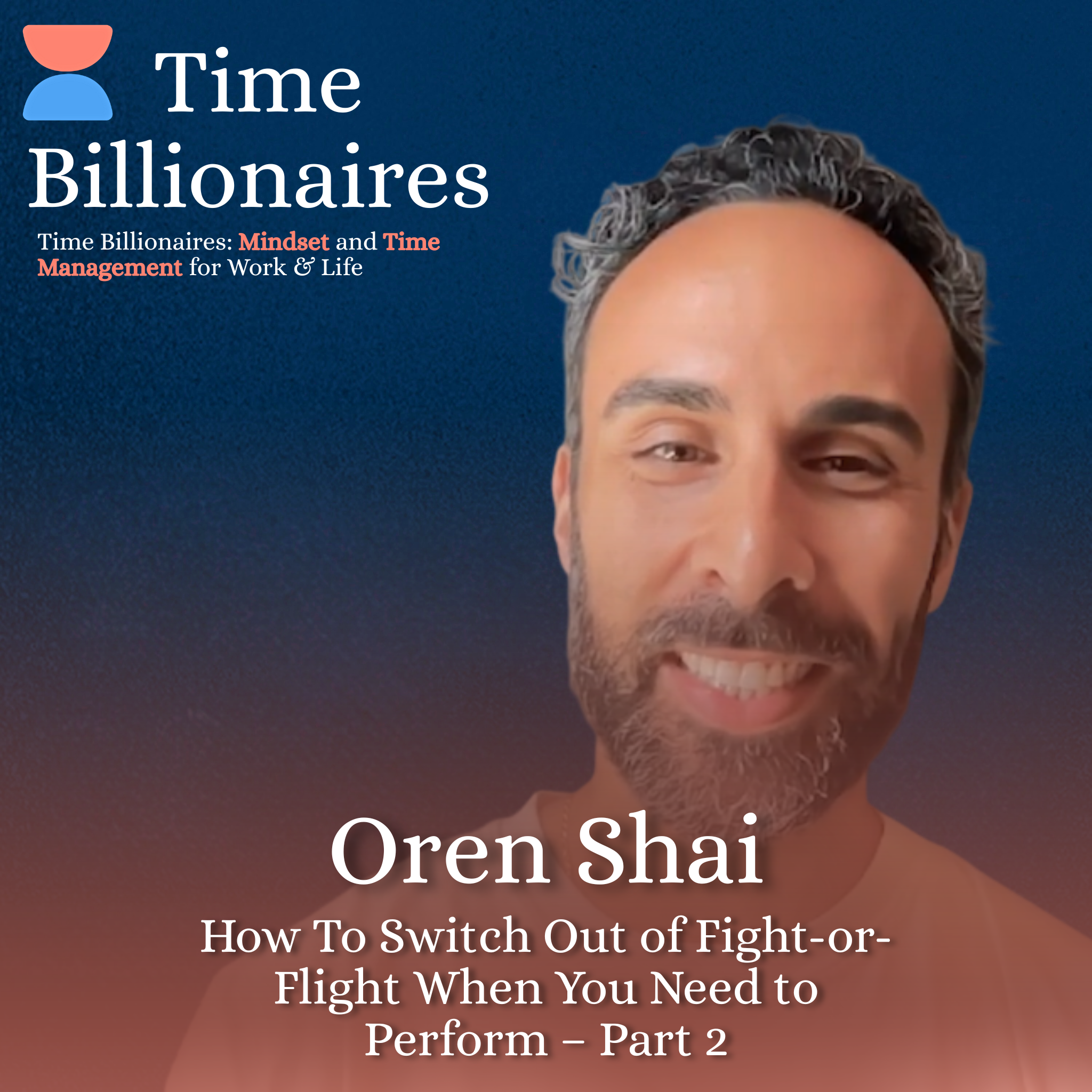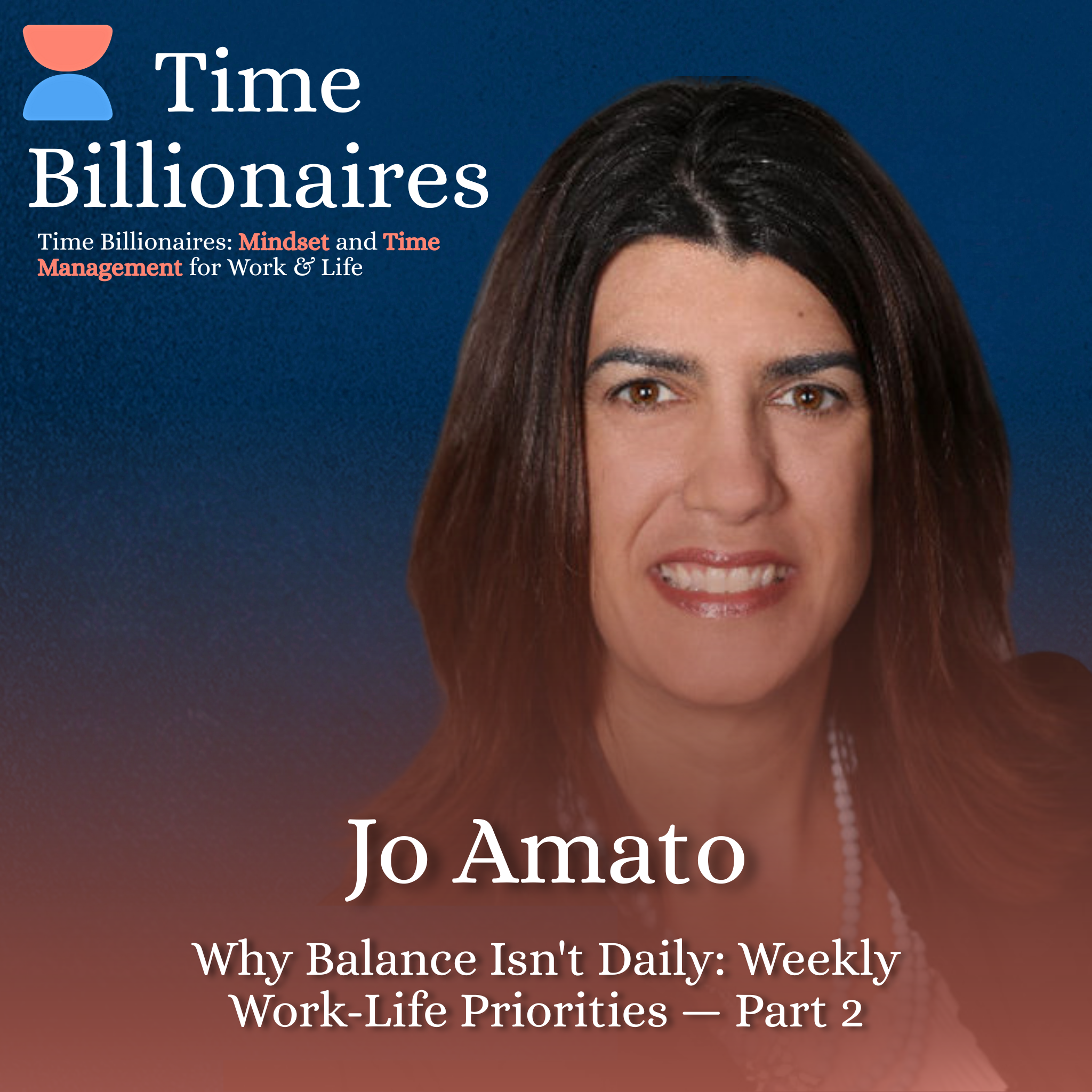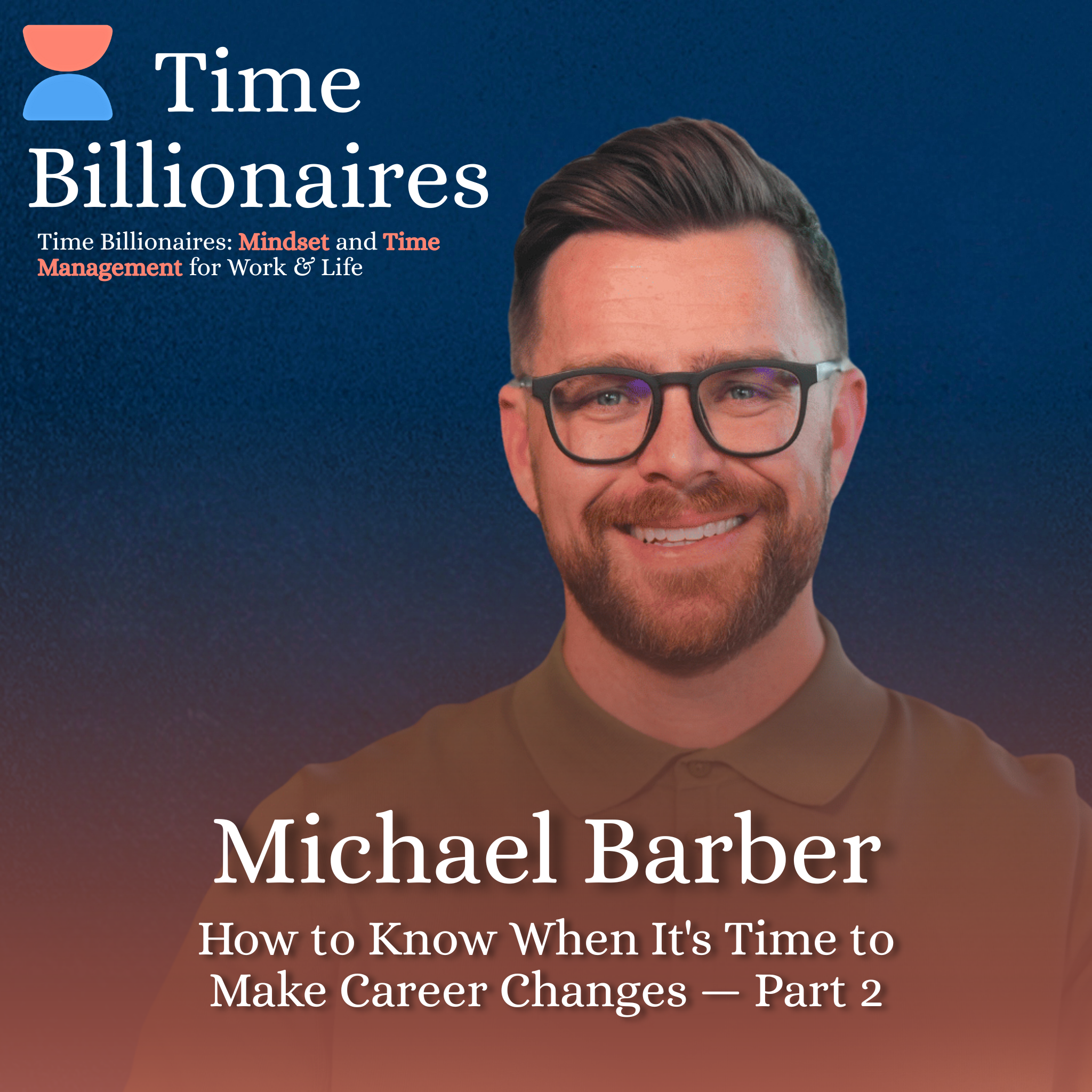Episode Transcript
[00:00:00] Speaker A: I would encourage folks to do more writing and sitting in stillness. I think those are two lost arts that I am very passionate about.
And when people talk about wanting to be more mindful, I think it's really easy and it's marketed to go want to lean towards meditation. Sitting in true silence I think is a lot harder than sitting down and writing your thoughts. Being still even for a couple moments after a situation or eventually and just asking yourself like how did that feel? How am I feeling right now? Is so powerful. So I would just encourage people to get to know themselves more. I've talked before about morning pages and just spending some time in the morning, free flow, writing whatever comes to mind. That is something you could do at any point.
[00:00:47] Speaker B: Hey there billionaire. Yep, I'm talking to you. If you expect to live another 31 years, you're already a billionaire. Not in money, but in the real measure of wealth, time. That's because 31 years is roughly a billion seconds. But most of us waste time in ways we'd never waste money. The currency of time billionaires is micro moments, the 90 second to 15 minute gaps hidden between the structured parts of your day. This podcast is about reclaiming them with quick, research backed ideas to help you feel more creative, productive and alive. Welcome to Time Billionaires. Let's make your next micro moment count.
[00:01:31] Speaker C: There's all these things we have to accomplish so we need to accomplish, but then you talk a lot about protecting the energy for the things that you want to do as well. I wonder if you could speak a little more to your approach there too.
[00:01:42] Speaker A: Yes, we can't do everything. And it's just a reminder that everything you say yes to comes at the expense of something that you might want to do.
And there is no shortage of people activities. I mean this isn't even getting into like the doom scrolling on your phone, which like I said, might be something where you're like I'm exhausted by everything that's going on I need and I'm choosing that time. But let's be intentional about what we need in the moment.
[00:02:14] Speaker C: So completely agree.
[00:02:15] Speaker A: I think it's just the reality that there will always be time to fill up the space. Which is why putting things on your calendar, putting fun on your calendar is important because if you don't, work will fill up its space, tasks around the house will fill up its space.
And the only way you're going to get what you want out of your day, which compounds into years, is to be mindful about how you're spending your day completely Agree.
[00:02:45] Speaker C: So does somebody who's feeling stuck or over committed or is trying to regain a sense of control in their lives, what advice would you give them?
[00:02:54] Speaker A: You're not alone.
It is a continual process and I think again, it's why I love systems, because you can go back to something.
Since implementing my whole three tiered framework, I have made yes commitments to things I probably should have said no to. And I probably said no to things where later on I'm like, oh man, I bet that was a really fun event. Should I have said no? So it's being kind to yourself and realizing that you should check in often. So I will say feelings are clues. Amazing. If you're feeling burned out and like something's off kilter, it probably is. And that is a beautiful moment to pause and say, what do I want to do next time? I think about our brains as computers that we get to reprogram and like make little software updates with. So I try to frame that where if I again say yes to something, where in retrospect I'm like, gosh, I should have known. That kind of event always leaves me depleted. And now I'm going into like whatever's going on at home or work the next next day with less energy instead of being like, ah, silly Marissa, how are you not better at this by now? It's okay. Another data point. And the next time I get that type of invitation or I'm going to feel an urge to go do something, I'm going to have that much more wisdom to make a choice that's more aligned with what I need. So I would tell that person who's struggling, life happens in seasons. Reflect on the season that you're in. If you are feeling burned out and you reflect and you think, well, what's going on in my personal life, what's going on in my professional life? And those things feel like they're very full. Like, great clue into saying no to more things and protecting your time elsewhere and getting very clear on what does survival look like, what are your core habits and just focusing and saying yes to those.
But if you look around and you're like, actually work has been pretty smooth and my relationships are pretty smooth and I'm still feeling burned out, then I would say it's probably something around you're spending your energy on the wrong things. And I would reflect and think, where do you gain the most energy?
And say more yeses to those types of activities. But we can't measure what we don't explore. So it starts with like, okay, what's going on around me? And are those things feeling like they're taking a lot of energy from me, or do they feel like they're giving me energy?
And then what do I know about myself? Or if I'm optimizing in my best way, what are those components? And if it's like, gosh, I haven't worked out in three weeks and working out always gives me energy, it's great. Put that on your calendar. Prioritize that. Being mindful of how we gain and lose energy is a superpower for sure.
[00:05:33] Speaker C: It's huge. There's so much in that that's brilliant. And I loved the self compassion element of thinking of this as data points. Mistakes, decisions you might have made differently as data points is huge. And something I like to remind myself is that the version of you who made that decision was actually a different version than you are right now. They didn't have this data point that you have. They didn't have that experience. They couldn't have known what you've learned since.
So that is, I think, an easier way to just be kind to yourself and say, that version of me had the same values maybe as this version, but they didn't have the same data. So it makes sense they would make a decision that I wouldn't right now.
[00:06:14] Speaker A: So good. I love that. Such a important reminder. And it just leaves all of the opportunity and fun back into what's ahead. I think when we try to go too far down the duh, why did I do that?
You remove the fun of learning and gaining more experience.
And that is, I think the cool part about doing this work, the cool part about what you're talking about on this podcast, which is like, you can be a more enlightened version of yourself just around the corner. And there's so much that we can do to, like, help ourselves help ourselves. And that should be a fun journey that we get curious about, not one that we feel like any shame that we should have known this years ago or any negativity. Like, it's all good, it's all learning, and we get to embrace that future version of ourselves just around the corner.
[00:07:03] Speaker C: We do. And it makes that learning more effective. I think we're so wired to think working harder makes the outcome better. And it doesn't. We learn through play. That's how we remember things. And so keeping that levity, I think, is huge.
[00:07:17] Speaker A: Yes. I love that you mentioned play too, because play has a big part in this.
[00:07:21] Speaker C: Yeah, it's one of the categories of micro Moments that I'm working on and writing about and there's just so much research behind it, which is great. Marissa, you are brilliant. This was fantastic. Is there anything I didn't ask or didn't give you a chance to express that you want to share?
[00:07:36] Speaker A: I would encourage folks to do more writing and sitting in stillness. I think those are two lost arts that I am very passionate about. And when people talk about wanting to be more mindful, I think it's really easy and it's marketed to go want to lean towards meditation that like sitting in true silence, I think is a lot harder than sitting down and writing your thoughts. Being still even for a couple moments after a situation or event and just asking yourself like how did that feel? How am I feeling right now? Is so powerful. So I would just encourage people to like get to know themselves more. I've talked before about morning pages and just spending some time in the morning free flow writing whatever comes to mind. That is something you could do at any point if you leave a meeting or an event or at the end of your work day. The first head of HR job I took for two or three years straight, I wrote after work before I went and drove home for a few minutes, probably a page or two. And it was just everything that had happened in that day and that compounded was able to show me like what parts of my job again gave me energy, took energy away. We talk about these topics like it's so easy, but it takes time to really go inward and reflect on how you feel and even get to know yourself again. So I would just encourage people get excited and curious about yourself just like you are about everything around you.
Writing and journaling without judgment is a superpower. And then asking yourself after certain situations or at the end of your workday, like how am I feeling? What do I need? I think are really good clues into again that balance that we talked about earlier of what do I need more of next? How do I want to spend my time for the rest of this day, week, year, life?
[00:09:28] Speaker C: Brilliant. And it doesn't take much time is what I'm hearing. Yeah, an exercise I like after every I do it after meetings, but I imagine you could do it after social events too. Just a one word, single word to describe it and it just sums it up. And I find it to be most effective with one on ones with my team because there's some single word that came out of it that's just a reminder. All the pages of notes that you have don't exactly capture how you're feeling what you need to do next. And I think that tends to cut through what's more actionable. And it doesn't take much time. It just plugs you into the most important takeaway, which is easy to forget as you then go to the next meeting, next thing, drive home.
[00:10:06] Speaker A: So good. So true.
[00:10:08] Speaker C: Amazing.
[00:10:08] Speaker A: One word.
[00:10:09] Speaker C: Just one word. Yeah. In your HR hat. We may cut this out of the episode, but we'll just chat. I actually came up with this first when I inherited a direct report who was underperforming and was told I'd probably need to let him go. And after our first one on one, the word that just stood out to me was young. I couldn't explain it. He wasn't biologically young. We were probably about the same age. But for whatever reason, the word young just stood out. And I realized over the next couple of weeks that he hadn't had the same exposure to this kind of corporate environment. He was the first one in his family to leave the state he grew up in to go to college, et cetera. So there were a lot of things that a lot of the people around me just took for granted that we knew how to dress, what is or isn't something you'd share about your weekend with colleagues, et cetera, that had nothing to do with his potential, but it was just impacting how he was perceived at work. And that became the difference to figuring out how to manage him. And he ended up becoming my successor, leading the department, one of the highest performing employees in two years. And it was just that inside there was something young psychologically that he needed more support on. That was just from that exercise.
[00:11:17] Speaker A: It's so good. And what you touch on has a million legs of where we could go. But it's exactly that. It's being aware of maybe those split second biases you have, judgments that you have that are so easy to just move on from and ignore. But what a monumental impact that moment made in that person's life when you just take a little bit of time to get curious about, okay, what am I coming away with? So kudos to you for that. Because if we had everybody being mindful of those micro thoughts and exploring them and getting curious, what a world we would have.
[00:11:52] Speaker C: I appreciate that it did benefit me and the company just as much because he'd been there for a while and I got lots of benefits. But I appreciate that. Thanks, Marissa. This was fantastic. I love this conversation. I love your insights and I so admire how you live your life so intentionally. I think that focus is so, so important for everyone to think about where we're giving up some agency, perhaps some learned helplessness in our lives and reclaiming it just one micro moment at a time. Thank you so much, Marissa.
[00:12:22] Speaker A: Thank you.
[00:12:28] Speaker B: Thanks for spending this micro moment with me. If you found it valuable, share it with a fellow time billionaire and give us a rating to help others discover the power of micro moments. For more ways to reclaim your time, check out timebillionaires.org and follow me. Rebecca Shadix on LinkedIn.
[00:12:44] Speaker C: See you next time.


